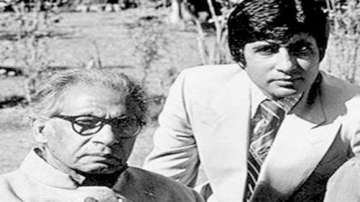With Madhushala, the world saw the emergence of author-poet Harivansh Rai Bachchan. In the year 1935, when Chhaayavaad (neo-romanticism) was making waves in the country, a lanky Harivansh Rai Srivastava wrote 135 quatrains (four-line verses) on a tavern or a wine house when he himself had not touched alcohol -- ever -- in his life.
But such was the power of his words that his audience, mostly intellectual youth, thought of him as a writer who loved his drinks.
A part of Bachchan's trilogy inspired by Omar Khayyam's Rubaiyat, which he had earlier translated into Hindi, the highly metaphorical work is still celebrated for its deeply Sufi incantations and philosophical undertones.
"Madiralay jaane ko ghar se chalta hai peene wala, kis path se jaun asmanjas mein hai woh bholabhaala,
Alag alag path batlaatey sab, par main ye batlaata hoon…raah pakad tu ek chala chal paa jayega Madhushala..."
Harivansh Rai Bachchan had never consumed alcohol, and was only 28 when he wrote the poem in 1935.
Madhushala has been translated into English, Bengali, Marathi and Malayalam. It has been choreographed, and performed on stage -- mostly by his son, the legendary Amitabh Bachchan.
Amitabh Bachchan is often asked about his father in his interactions with the media, and the megastar only has remarkable things to say about him.
He once revealed why Harivansh Rai Bachchan changed his surname from Srivastava to Bachchan.
"My father was totally averse to the caste system. According to him, the surnames give others an inkling of the caste one belongs to. But the world cannot and should not function like that. Srivastava depicts the Kayastha caste -- a Hindu sub-caste. He changed it and kept Bachchan as his surname. The entire family then kept this surname," Amitabh Bachchan said.
"Par bolo tootey taaron ka kab ambar shok manaata hai.... Jo beet gayi so baat gayi..."
Amitabh Bachchan is also often heard speaking about how his father taught him to be optimistic about life.
"I keep quoting my father. One of the very first things he taught me in life was to accept. He said, 'Mann ka ho toh achchha, mann ka no ho toh zyaada achchha.' Because when things are not happening according to your wish, they are happening according to the wish of some divine force and that divine force will never think ill about you," Big B once said.
Harivansh Rai Bachchan, one of the biggest forces to take Hindi to the stature it is at now, holds a PhD in English -- he did his doctoral thesis on W B Yeats. He is only the second Indian to get a doctorate in English literature from the Cambridge University.
Harivansh Rai Bachchan was nominated to the Rajya Sabha in 1966 and received the Sahitya Akademi award three years later. He was honoured with the Padma Bhushan for his immense contribution to Hindi literature, in the year 1976.
The Wordsmith who, in many ways, propagated neo-romanticism in modern India breathed his last on January 18, 2003.
Harivansh Rai Bachchan would often introduce himself with these lines, and nothing explained him better than this: "Mitti ka tann, masti ka mann, kshan-bhar jeevan -- mera parichay."
This remains his introduction till date....
ALSO READ | अमिताभ बच्चन ने बताया, क्यों उनके पिता ने अपनाया था 'बच्चन' सरनेम
